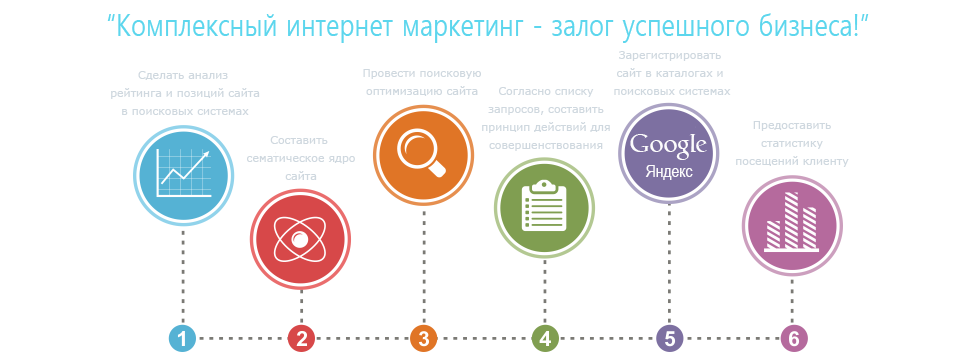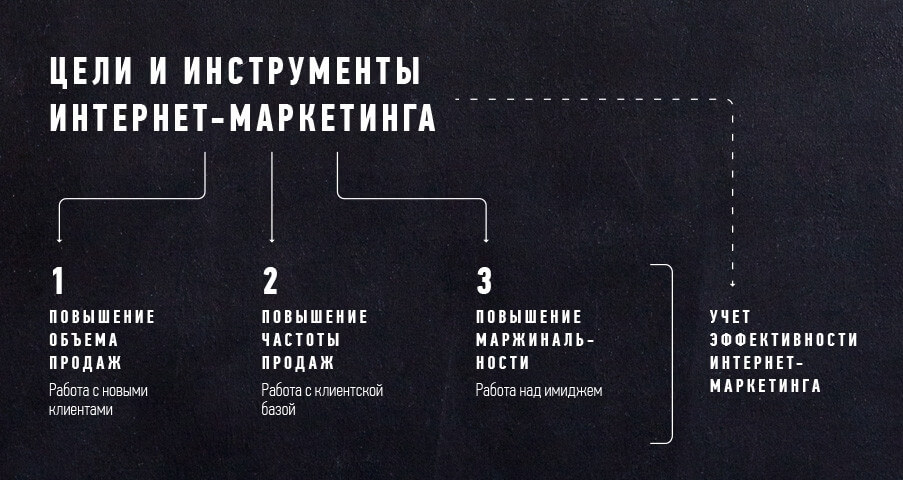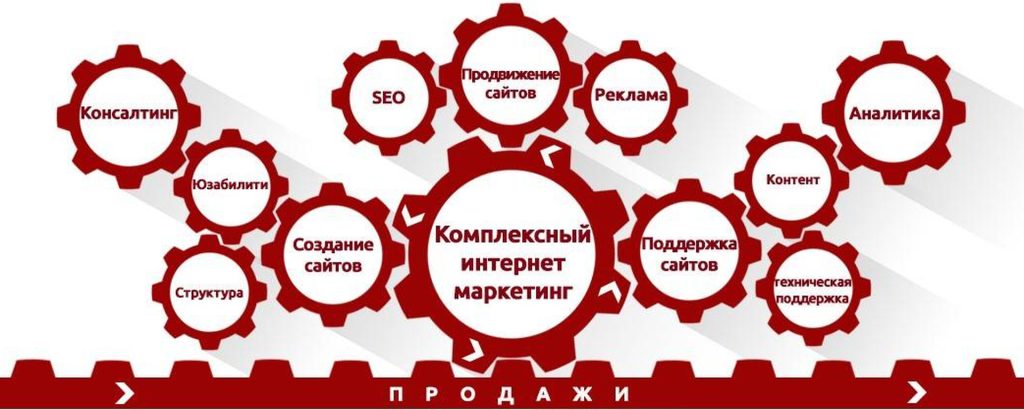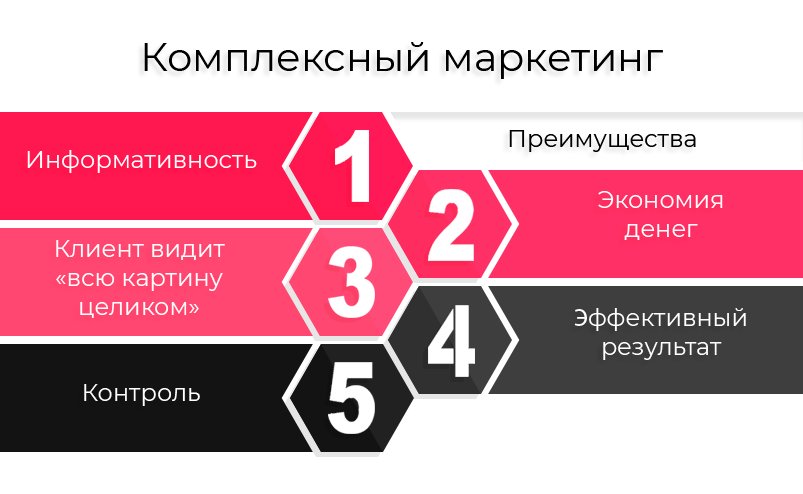Что такое комплексный интернет-маркетинг?
Комплексный интернет-маркетинг — это применение полного набора инструментов и каналов привлечения целевой аудитории, которые наиболее эффективны для вашего бизнеса.
Стратегия комплексного интернет-маркетинга строится на непрерывном улучшении контента вашего веб-сайта. Это приводит к оптимизации поведенческих факторов, повышению доверия аудитории, увеличению потока потенциальных клиентов и росту фактических продаж.
Она также включает продвижение на различных поисковых запросах, включая высокочастотные, среднечастотные и низкочастотные. Отсутствуют какие-либо ограничения для добавления новых ключевых фраз: расширение семантического ядра способствует увеличению поискового трафика.
Комплексный интернет-маркетинг не сводится только к рейтингу в поисковой выдаче, ссылкам или манипуляциям с поведенческими факторами. Он фокусируется на конкретных показателях, которые могут быть ясно измерены — целевой трафик, количество потенциальных клиентов и реальные продажи.
Он также включает разработку и реализацию контент-маркетинговой стратегии, без которой достичь успеха невозможно. Это включает создание высококачественного контента, специально адаптированного к вашей целевой аудитории. Универсального подхода не существует. Для достижения хороших результатов необходим индивидуальный план развития и создание интересного и уникального контента. Идеальные тексты должны быть настолько привлекательными, чтобы удерживать внимание аудитории на постоянной основе.

Цели и задачи комплексного маркетинга
Комплексное продвижение бизнеса в интернете включает в себя широкий набор задач и целей, направленных на достижение успеха и улучшение видимости компании в онлайн-среде. В этом тексте рассмотрим основные задачи и цели, которые возникают при комплексном продвижении бизнеса в интернете.
Одной из главных задач комплексного продвижения является привлечение целевой аудитории. Безопределение и привлечение правильной аудитории является основой успешного онлайн-бизнеса. Целевая аудитория — это люди, которые заинтересованы в вашем продукте или услуге и могут стать потенциальными клиентами. Задача заключается в том, чтобы достичь этих людей, привлечь их внимание и заинтересовать предложением вашего бизнеса.
Другая важная задача — повышение узнаваемости бренда. Комплексное продвижение помогает укрепить позицию вашего бренда в сознании целевой аудитории. Цель состоит в том, чтобы создать положительное восприятие бренда, установить доверие и лояльность к нему. Это достигается путем активного продвижения бренда на различных онлайн-платформах, создания уникального контента, взаимодействия с аудиторией через социальные сети и другие каналы коммуникации.
Следующая задача — увеличение конверсии. После привлечения целевой аудитории важно превратить их в действующих клиентов. Цель заключается в том, чтобы увеличить конверсию посетителей в покупателей или в действия, которые приносят пользу вашему бизнесу, такие как подписка на рассылку, регистрация на сайте или скачивание приложения. Для этого используются различные инструменты, такие как оптимизация веб-сайта, улучшение пользовательского опыта, создание убедительных предложений и мотивирующих вызовов к действию.
Еще одна задача комплексного продвижения — улучшение видимости в поисковых системах. Цель состоит в том, чтобы ваш веб-сайт появлялся в результатах поиска при соответствующих запросах потенциальных клиентов. Для достижения этой цели необходимо проводить поисковую оптимизацию, создавать высококачественный контент, использовать ключевые слова, а также привлекать внешние ссылки на ваш сайт.
Наконец, одна из главных целей комплексного продвижения — увеличение прибыли и рост бизнеса. В конечном счете, все усилия по продвижению должны привести к увеличению продаж и доходов компании. После достижения всех вышеупомянутых задач и целей, компания сможет получить более высокий уровень прибыли и обеспечить стабильный рост своего бизнеса в онлайн-среде.
Комплексное продвижение бизнеса в интернете требует систематического подхода, постоянного анализа и оптимизации стратегии. Задачи и цели могут различаться в зависимости от специфики бизнеса, но общая идея заключается в достижении максимальной эффективности и успеха в онлайн-среде.

Из чего состоит комплексный интернет-маркетинг текст заголовка
Составляющие комплексного интернет-маркетинга
- Усиление классического маркетинга
- Расширение возможностей классического маркетинга.
- Идентификация, сегментация и привлечение новых аудиторий, о которых ранее не задумывались.
- Устойчивый поток заявок из всех сегментов целевой аудитории, независимо от платной рекламы.
- Детальный отчет о доходности каждого вложенного доллара в рекламу.
- Координация и контроль продвижения и продаж в различных регионах (для дилеров/филиалов).
- Настройка системы телефонии и контроль заявок, полученных по телефону.
- Обучение, автоматизация и контроль продаж, внедрение системы управления взаимоотношениями с клиентами (CRM).
Что отличает комплексный интернет-маркетинг от одиночных услуг?
Полноценный комплексный проект охватывает весь жизненный цикл клиента, в то время как отдельные инструменты интернет-маркетинга фокусируются только на определенных этапах воронки продаж (помечены желтым на рисунке).
Однако комплексный интернет-маркетинг отличается от этих отдельных инструментов. Он включает работу с сформировавшимся спросом и онлайн-заказами товаров. Важно отметить, что начальные этапы клиентского пути, такие как формирование потребностей и принятие решений, остаются вне сферы видимости комплексного интернет-маркетинга, даже если покупатель рассматривает несколько рынков, включая ваш.
Для компаний, занимающихся комплексным интернет-маркетингом, но не предоставляющих все виды услуг, основным приоритетом является продажа через сеть, не учитывая телефонные заявки и заказы через оффлайн-точки, особенно важные для B2B. Кроме того, эти компании считают успехом количество лидов, заявок и заказов. Однако жизненный цикл клиента не ограничивается этими метриками, он продолжается и развивается далее очень активно.
Все это говорит о том, что истинно эффективным комплексный интернет-маркетинг будет только при наличии индивидуально разработанной стратегии. Запуск контекстной рекламы, SEO или веб-разработки невозможен без понимания того, как эти 10-12 инструментов интернет-маркетинга связаны между собой и как они соответствуют целям вашего бизнеса. Ведь простые продажи или заявки недостаточны для достижения высокого уровня вашей компании.
Нельзя назвать комплексным:
- разработку сайта;
- оплату за лиды (продвижение по заявкам) и звонки;
- оплату за рейтинг сайта или увеличение трафика;
- повышение продаж с помощью контекстной рекламы;
- оплату за повышение конверсии сайта;
- оплату за консультационные услуги.

Кому подходит комплексный маркетинг, а кому нет
Какие предприятия смогут обойтись без комплексного интернет-маркетинга:
Малые и микрофирмы, которые не ставят перед собой амбициозных целей и фокусируются на поддержании текущего уровня продаж.
Средние и крупные компании с ограниченным или слабым маркетингом, где руководство стремится получить только новый веб-сайт и отчеты о позициях, трафике, лидах, звонках и конверсиях.
Бренды, которым требуются всеобъемлющие рекламные кампании и работают с такими показателями, как CTR, CPA, CPM.
Компании разных уровней, имеющие отдел интернет-маркетинга, но готовые передавать «темные» операции другим.
Массовые бизнесы с низкой маржой, которые не могут себе позволить простои и не готовы выделять время и бюджет на аналитику.
Организации с низким уровнем организации, где нет четкого планирования ресурсов. Если у компании нет бизнес-стратегии на годы вперед, то комплексный интернет-маркетинг не имеет смысла.
Для кого необходим комплексный подход:
Для амбициозных компаний, которые смогут достичь прорыва, полностью погрузившись в проект.
Для предприятий с четкими и однозначными целями, вписанными в долгосрочный план.
Для фирм с комплексными товарами или услугами, для которых еще не сформирован или слабо сформирован спрос, и требуется разработка полного комплекса маркетинговых мероприятий, начиная с исследований.
Для компаний с сильным маркетингом и маркетологами, которые активно занимаются аналитической работой и не нуждаются только в лидах/трафике/CTR.
Для российских производителей, осуществляющих продажи через дилеров, фирменные магазины или другие представительства.
Для компаний с развитой сетью филиалов

Основные инструменты интернет-маркетинга
Интернет-маркетинг — это мощный набор инструментов и стратегий, которые позволяют компаниям эффективно продвигать свой бизнес в онлайн-среде. Вот некоторые из ключевых инструментов интернет-маркетинга, которые используются для достижения поставленных целей:
- Поисковая оптимизация (SEO): Это процесс оптимизации веб-сайта с целью получения высоких позиций в поисковых результатах. Он включает в себя оптимизацию контента, ключевых слов, мета-тегов, скорости загрузки страницы и других факторов, чтобы улучшить видимость сайта и привлечь органический трафик.
- Поисковая реклама (SEM): Включает использование платных рекламных кампаний на поисковых платформах, таких как Google Ads, для привлечения трафика на сайт. Рекламодатели могут размещать объявления в поисковых результатах или на других сайтах, используя контекстную рекламу.
- Социальные медиа-маркетинг: Включает использование платформ социальных сетей, таких как Facebook, Instagram, Twitter и LinkedIn, для продвижения бренда, привлечения аудитории, взаимодействия с клиентами и создания сообщества вокруг бизнеса.
- Контент-маркетинг: Этот инструмент фокусируется на создании и распространении полезного, информативного и привлекательного контента, такого как статьи, блоги, видео, инфографика и электронные книги. Цель состоит в том, чтобы привлечь и удержать внимание аудитории, установить авторитетность и создать потенциальные лиды.
- Email-маркетинг: Это использование электронной почты для прямого взаимодействия с клиентами и потенциальными клиентами. Компании могут отправлять персонализированные электронные рассылки, предлагать специальные предложения, информировать о новостях и событиях, а также поддерживать долгосрочные отношения с клиентами.
- Реклама в видеоформате: С увеличением популярности видео контента, рекламодатели могут использовать видео-платформы, такие как YouTube, для размещения видеорекламы. Видеоролики могут быть промо-роликами, рекламными роликами перед просмотром контента или спонсорскими материалами в блогах и каналах партнеров.
- Аналитика и отслеживание: Это важный компонент интернет-маркетинга, который позволяет оценивать результаты и эффективность маркетинговых кампаний. Инструменты аналитики, такие как Google Analytics, предоставляют данные о посещаемости сайта, поведении пользователей, источниках трафика и других метриках, чтобы помочь принимать обоснованные решения и оптимизировать маркетинговые усилия.
Комплексное использование этих инструментов позволяет создать мощную интернет-маркетинговую стратегию, привлечь больше целевой аудитории, повысить узнаваемость бренда, увеличить продажи и достичь успеха в онлайн-среде.

Conclusion
В заключение можно сказать, что комплексное продвижение бизнеса в интернете играет ключевую роль в достижении успеха и роста компании в онлайн-среде. Оно объединяет множество инструментов и стратегий, направленных на привлечение целевой аудитории, увеличение видимости бренда, генерацию качественных лидов и увеличение объемов продаж.
Суть комплексного подхода заключается в том, чтобы не ограничиваться одним инструментом или каналом, а использовать все возможности интернет-маркетинга в совокупности. Это включает в себя поисковую оптимизацию, контент-маркетинг, социальные сети, контекстную рекламу, email-маркетинг, аналитику и многое другое. Каждый из этих компонентов взаимодействует и дополняет друг друга, создавая синергетический эффект и обеспечивая максимальную эффективность в продвижении бизнеса.
Комплексное продвижение позволяет компаниям выделиться на фоне конкурентов, привлечь больше потенциальных клиентов, укрепить доверие аудитории, повысить конверсию и улучшить финансовые показатели. Это долгосрочный процесс, требующий постоянной работы, анализа и оптимизации, но результаты стоят затраченных усилий.
В современном цифровом мире комплексное продвижение бизнеса в интернете становится все более важным и необходимым. Оно позволяет компаниям успешно адаптироваться к изменениям в потребительском поведении, эффективно конкурировать на рынке и добиваться поставленных целей. Таким образом, инвестиции в комплексный интернет-маркетинг являются неотъемлемой частью стратегии развития современного бизнеса и способом обеспечить его процветание в онлайн-мире.







